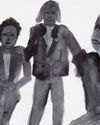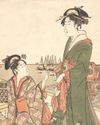
We meet Ian Griffiths, the creative director of Max Mara, for a one-on-one interview at Singapore's historical The Fullerton Bay Hotel — in The Landing Point dining area with a view of the Singapore River before us. The former punk rocker from the North of England is wearing a suit from Savile Row tailor Timothy Everest, but assures us that although he dresses in a classic way, he is not a conservative. This is a fitting location: The high ceilings, and modern, light-filled space has both a sense of history and of ease — two elements that play a considerable part in each collection that Griffiths has designed for the brand.
The affable 53-year-old Brit has seen Max Mara grow from strength to strength since 1987, when he joined the company, fresh out of fashion school. Today, he remains respectful of the brand’s heritage and its customers, having worked as an in-house designer for the brand for over 20 years before his current appointment. He is clear about the brand’s philosophy of real clothes for real women, which still holds true today, and describes it as his automatic instinct. He also knows that retaining existing Max Mara customers — some of whom have been wearing the brand throughout their decades-long careers — is of utmost importance. He mentions that his 83-year-old mother is his star and that, “it would be a tremendous betrayal to abandon the woman that we have been dressing all the way through her career.” Griffiths has clear ideas on how to attract the youth market and will not succumb to trends like doing streetwear for the sake of it. “I think that for me, the important thing about pursuing a younger market was not to throw all the cards up in the air and throw the baby out with the bathwater — to mix metaphors. I wanted to find a way of making a younger market, want to come to us rather than us to chase after the young market,” says Griffiths.
Bu hikaye T Singapore: The New York Times Style Magazine dergisinin February 2020 sayısından alınmıştır.
Start your 7-day Magzter GOLD free trial to access thousands of curated premium stories, and 9,000+ magazines and newspapers.
Already a subscriber ? Giriş Yap
Bu hikaye T Singapore: The New York Times Style Magazine dergisinin February 2020 sayısından alınmıştır.
Start your 7-day Magzter GOLD free trial to access thousands of curated premium stories, and 9,000+ magazines and newspapers.
Already a subscriber? Giriş Yap

Look At Us
As public memorials face a public reckoning, there’s still too little thought paid to how women are represented — as bodies and as selves.

Two New Jewellery Collections Find Their Inspiration In The Human Anatomy
Two new jewellery collections find their inspiration in the human anatomy.

She For She
We speak to three women in Singapore who are trying to improve the lives of women — and all other gender identities — through their work.
Over The Rainbow
How the bright colours and lively prints created by illustrator Donald Robertson brought the latest Weekend Max Mara Flutterflies capsule collection to life.

What Is Love?
The artist Hank Willis Thomas discusses his partnership with the Japanese fashion label Sacai and the idea of fashion in the context of the art world.

The Luxury Hotel For New Mums
Singapore’s first luxury confinement facility, Kai Suites, aims to provide much more than plush beds and 24-hour infant care: It wants to help mothers with their mental and emotional wellbeing as well.

Who Gets To Eat?
As recent food movements have focused on buying local or organic, a deeper and different conversation is happening among America’s food activists: one that demands not just better meals for everyone but a dismantling of the structures that have failed to nourish us all along.

Reimagining The Future Of Fashion
What do women want from their clothes and accessories, and does luxury still have a place in this post-pandemic era? The iconic designer Alber Elbaz thinks he has the answers with his new label, AZ Factory.

A Holiday At Home
Once seen as the less exciting alternative to an exotic destination holiday, the staycation takes on new importance.
All Dressed Up, Nowhere To Go
Chinese supermodel He Sui talks about the unseen pressures of being an international star, being a trailblazer for East Asian models in the fashion world, and why, at the end of the day, she is content with being known as just a regular girl from Wenzhou.